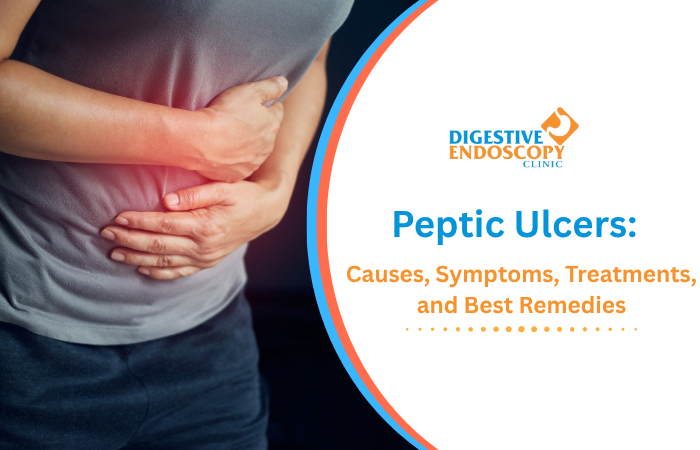
Peptic Ulcers: Causes, Symptoms, Treatments, and Best Remedies
Do you often feel a burning pain in your stomach, especially between meals or at night? Have you been popping antacids too often? If yes, you could be dealing with more than just simple acidity — you might have a peptic ulcer.
While many people think ulcers are caused by stress or spicy food, the reality is more complex. Thankfully, with proper medical care, peptic ulcers can be treated completely.
In this comprehensive guide, Dr. Suresh Jain, a highly respected gastroenterologist at the Digestive Endoscopy Clinic, explains what peptic ulcers are, what causes them, how to treat them, and how to manage them naturally.
What Exactly Are Peptic Ulcers?
A peptic ulcer is a sore that forms in the inner lining of the stomach or upper part of the small intestine. These ulcers occur when stomach acid damages the protective lining of the digestive tract.
There are mainly two types:
- Gastric Ulcers – develop inside the stomach
- Duodenal Ulcers – occur in the upper section of the small intestine (duodenum)
In both cases, the result is a painful, inflamed wound that can cause significant discomfort and health problems if untreated.
What Causes Peptic Ulcers?
Ulcers develop when there is an imbalance between the digestive acids and the protective mechanisms of the stomach. Here are the key culprits:
1. Helicobacter pylori (H. pylori) infection
This bacteria is responsible for almost 60–70% of all ulcers. It weakens the protective mucus and allows acid to irritate the stomach lining.
2. Non-steroidal anti-inflammatory drugs (NSAIDs)
Long-term or frequent use of painkillers like ibuprofen, aspirin, or diclofenac can damage the stomach lining and cause ulcers.
3. Smoking and Alcohol
These substances weaken the stomach’s defenses and slow down healing of existing ulcers.
4. Stress and Diet
While not direct causes, emotional stress and poor eating habits can worsen symptoms and delay recovery.
Symptoms: What Do Peptic Ulcers Feel Like?
Peptic ulcers can go unnoticed in their early stages, but common symptoms include:
- Burning or gnawing pain in the upper abdomen
- Pain that worsens on an empty stomach or at night
- Temporary relief after eating or taking antacids
- Nausea or bloating
- Unexplained weight loss
- Loss of appetite
- Dark or black stools (sign of internal bleeding)
If you experience vomiting blood, fainting, or severe abdominal pain — it could be a sign of complications and needs urgent medical attention.
How Are Peptic Ulcers Diagnosed?
At Digestive Endoscopy Clinic, Dr. Suresh Jain uses a combination of history, clinical symptoms, and diagnostic tests to confirm ulcers:
- Endoscopy : This is the gold standard. A thin tube with a camera is inserted through the mouth to directly view the ulcer.
- pylori Tests : Breath tests, stool antigen tests, or biopsy during endoscopy help detect bacterial infection.
- Blood Tests & Imaging : Sometimes blood tests or an upper GI X-ray may be used to rule out complications.
- Treatment Options for Peptic Ulcers : The treatment depends on the underlying cause and severity. The goal is to kill the infection, reduce acid, and allow the ulcer to heal.
Medication Includes:
- Antibiotics – To eliminate H. pylori bacteria
- Proton Pump Inhibitors (PPIs) – Reduce acid production (e.g., omeprazole, pantoprazole)
- H2 blockers – Alternative acid reducers
- Antacids – Neutralize stomach acid and offer fast relief
- Protective agents – Such as sucralfate to coat and protect ulcer sites
Important: Complete the full course of treatment even if symptoms improve, or the ulcer may return.
Natural Remedies & Lifestyle Changes for Ulcer Management
Alongside medication, the following natural and supportive measures can help speed up healing and prevent recurrence.
Diet Tips:
- Eat small, frequent meals
- Include soothing foods: banana, curd, rice, oats, apples, cabbage juice
- Drink plenty of water
- Avoid: spicy foods, caffeine, aerated drinks, fatty foods
Stress Reduction:
- Practice meditation, yoga, or deep breathing
- Take regular walks
- Avoid mental strain, especially while eating
Probiotics:
Add probiotic-rich foods like curd or take supplements to restore healthy gut bacteria, especially after antibiotics.
Avoid These:
- Smoking and alcohol
- Late-night eating
- Overuse of NSAIDs
- Skipping meals or crash dieting
What Happens If Ulcers Are Left Untreated?
Ignoring ulcers can lead to serious complications like:
- Bleeding ulcers
- Perforation (hole in the stomach or intestine)
- Gastric outlet obstruction
- Increased risk of stomach cancer, especially with chronic H. pylori infection
Early diagnosis and timely treatment can prevent all of these complications.
Comprehensive diagnosis and gentle treatment for your digestive health.
Dr. Suresh Jain brings over two decades of experience in diagnosing and treating digestive disorders, including acid reflux, ulcers, and GI bleeding. At Digestive Endoscopy Clinic, you receive:
- Advanced and painless endoscopy procedures
- Personalized and holistic treatment plans
- Education and diet counseling
- Compassionate and friendly care for all age groups
Peptic ulcers are painful but completely manageable with proper care. Don’t let stomach pain take over your life. If you’ve been ignoring symptoms or relying on antacids, it’s time to get evaluated by a gastroenterology expert.
Schedule your consultation today with Dr. Suresh Jain.
At Digestive Endoscopy Clinic – Trusted for gastrointestinal care and advanced diagnostics
Early detection. Accurate treatment. Long-term healing.
